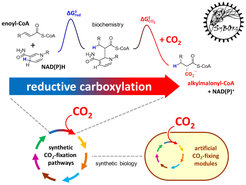The SYBORG Project: Fighting global warming with synthetic biology (Max Planck Research Group Tobias Erb)
How can we reduce the increase of CO2 in the atmosphere and tackle the phenomenon of global warming? This is one of the most challenging questions for which science and society have not found a satisfying answer, yet. Now, researchers at the Max Planck Institute for Terrestrial Microbiology want to explore new ways to address this problem. Combining biochemistry with synthetic biology, the research group of Tobias Erb aims at engineering highly effcient catalysts and synthetic modules for the conversion of CO2 into green products. The research project with the name SYBORG is funded by one of the prestigious Starting Grants of the European Research Council (ERC).
LEARNING FROM BIOLOGY FOR FUTURE CHEMISTRY
„Temporary chemistry does not offer any suitable catalysts that allow removing CO2 from the atmosphere and convert the green house gas CO2 into a sustainable product“, says Tobias Erb, group leader at the MPI Marburg and principal investigator of SYBORG. „Microorganisms, however, have evolved a number of carboxylating enzymes – powerful biocatalysts – that are able to transform CO2 into organic matter on a billion ton scale per year“, adds Erb. „Following Max Planck´s principle of ‚insight must proceed application‘, the motivation of our research is to learn these tricks from the microbes and to apply them in chemistry and synthetic biology to create novel options for the sustainable conversion of CO2.“
Within the framework of the SYBORG project, the Max Planck researchers will focus on reductive carboxylases, which are the most efficient CO2-fixing enzymes discovered in Nature so far. Studying the biochemistry of these enzymes is esssential to understand the underlying catalytic principle. „A successful transfer of this principle into chemistry will pave the way for the development of highly efficient CO2-fixing catalysts in future“, hopes Gabriele Stoffel, one of the scientists in the SYBORG-team.

BEATING EVOLUTION WITH SYNTHETIC BIOLOGY
The SYBORG-team also plans to use reductive carboxylases to design biologically inspired pathways for the conversion of CO2. To that end, the scientists will recombine and reshuffle reactions known from biology to create artificial CO2-fixation pathways that are more efficient than the natural ones evolved in microorganisms and plants. „Our vision is to implement these artificial CO2-fixing pathways in minimal cells to create synthetic modules for CO2-fixation“, explains Thomas Schwander, another scientist in Erb´s team. This experimental approach of using biological building blocks to reconstruct life processes, is also known as ‚Synthetic Biology‘, and has become a hot topic in life sciences. Marburg with its center for synthetic microbiology (SYNMIKRO) is one of the emerging hotspots in Europe for this new biological discipline, providing a perfect scientific environment for the SYBORG-team.
TOWARDS A NEW BIOLOGY
The developments in temporary biology remind Tobias Erb of a situation in chemistry a hundred years ago. „Back then, chemistry changed into a truly synthetic discipline, making it possible to produce novel compounds that are not of natural origin. This has changed our world since then“, Erb notes. As an example, the chemical synthesis of fertilizers, based on the Haber-Bosch process, has increased agricultural productivity to feed the ever growing world population.
„With our approaches, we aim at transforming biology into the synthetic discipline of the 21st century. However, there is still a long way to go for synthetic biology and many problems are ahead. But with SYBORG in Marburg we might be able to do the first steps into this new direction and towards this novel kind of biology“, concludes Erb.
News and updates on the SYBORG project can be found under www.mpi-marburg.mpg.de/erb and on Twitter: https://twitter.com/erblabs
